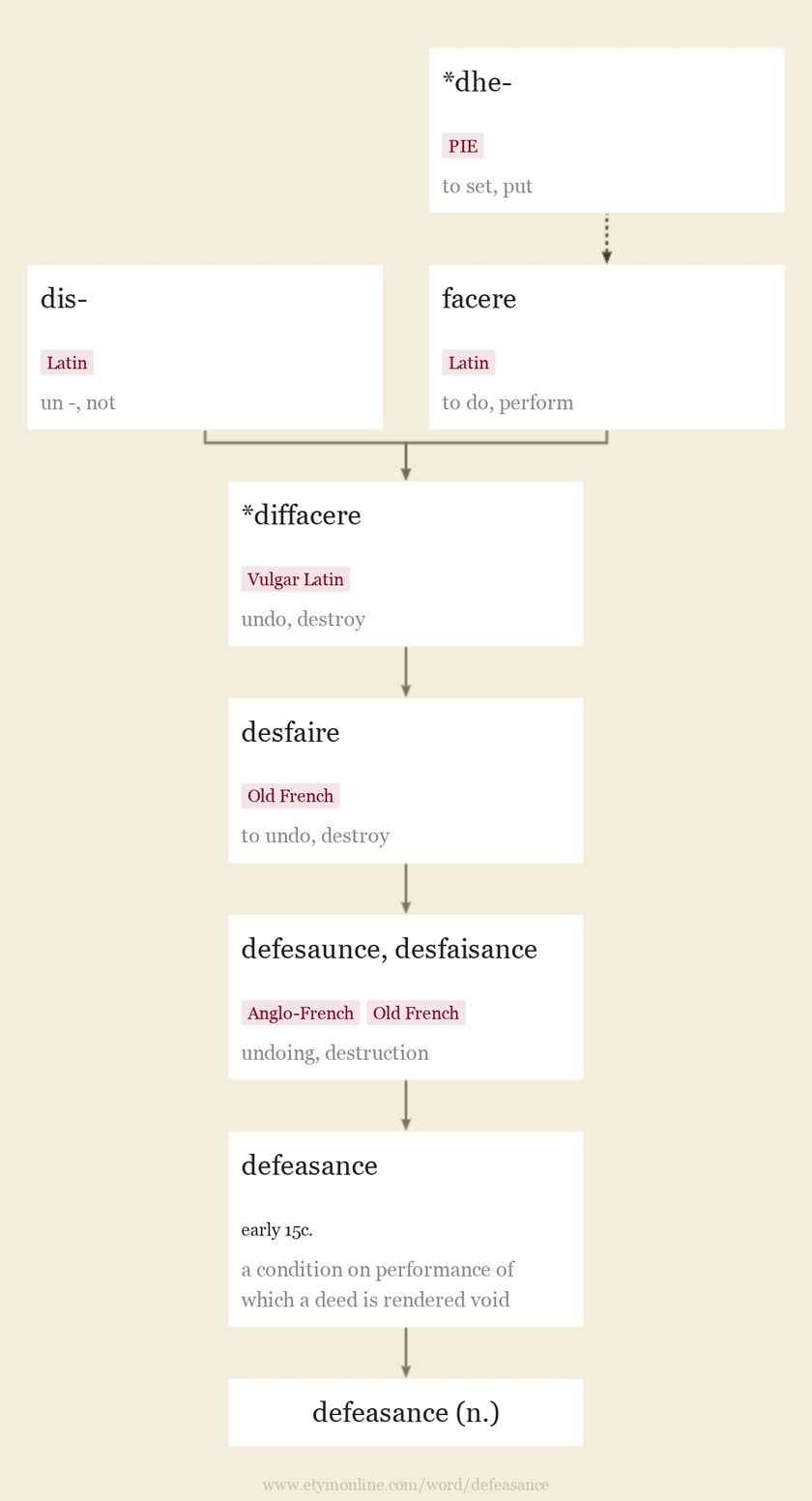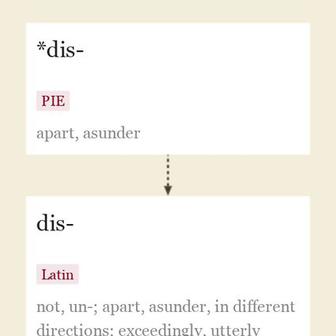defeasance (n.)
15世纪早期,“使契约无效的履行条件”,源自盎格鲁-法语 defesaunce,古法语 desfaisance “撤销,破坏”,源自 desfaire(现代法语 défaire)“撤销,破坏”,源自通俗拉丁语 *diffacere “撤销,破坏”,源自拉丁语 dis- “不,非”(见 dis-) + facere “做,执行”,源自 PIE 词根 *dhe- “放置,放置”。相关词汇: Defease; defeasible。

defeasance 的相关词汇
*dhē-,原始印欧词根,意为“设定,放置”。
它构成以下词汇的全部或部分: abdomen; abscond; affair; affect(第一动词)“在心中留下印象”; affect(第二动词)“假装”; affection; amplify; anathema; antithesis; apothecary; artifact; artifice; beatific; benefice; beneficence; beneficial; benefit; bibliothec; bodega; boutique; certify; chafe; chauffeur; comfit; condiment; confection; confetti; counterfeit; deed; deem; deface; defeasance; defeat; defect; deficient; difficulty; dignify; discomfit; do(动词); doom; -dom; duma; edifice; edify; efface; effect; efficacious; efficient; epithet; facade; face; facet; facial; -facient; facile; facilitate; facsimile; fact; faction(名词1)“政党”; -faction; factitious; factitive; factor; factory; factotum; faculty; fashion; feasible; feat; feature; feckless; fetish; -fic; fordo; forfeit; -fy; gratify; hacienda; hypothecate; hypothesis; incondite; indeed; infect; justify; malefactor; malfeasance; manufacture; metathesis; misfeasance; modify; mollify; multifarious; notify; nullify; office; officinal; omnifarious; orifice; parenthesis; perfect; petrify; pluperfect; pontifex; prefect; prima facie; proficient; profit; prosthesis; prothesis; purdah; putrefy; qualify; rarefy; recondite; rectify; refectory; sacrifice; salmagundi; samadhi; satisfy; sconce; suffice; sufficient; surface; surfeit; synthesis; tay; ticking(名词); theco-; thematic; theme; thesis; verify。
它是以下词汇的假定来源/其存在的证据为:梵语 dadhati “放置,安排”; 阿维斯塔语 dadaiti “他放置”; 古波斯语 ada “他制造”; 赫梯语 dai- “放置”; 希腊语 tithenai “放置,设置,安置”; 拉丁语 facere “做,干; 执行; 带来”; 立陶宛语 dėti “放置”; 波兰语 dziać się “正在发生”; 俄语 delat' “做”; 古高地德语 tuon,德语 tun,古英语 don “做”。

拉丁语词缀,意为1. “缺乏,不”(如 dishonest); 2. “相反,做相反的事”(如 disallow); 3. “分开,离开”(如 discard),源自古法语 des- 或直接源自拉丁语 dis-,意为“分开,分离,朝不同方向,比喻为‘不,非’,也表示‘极其,完全’。在大多数有声辅音前,它被同化为 dif-,在 -f- 前被同化为 di-。
拉丁语前缀来自原始印欧语言的 *dis-,意为“分开,分离”(源自古英语 te-,古撒克逊语 ti-,古高地德语 ze-,德语 zer-)。原始印欧语言的根词是 *dwis- 的次生形式,因此与拉丁语 bis “两次”(最初为 *dvis)和 duo 有关,表示“两种方式,分开”(因此表示“分开,分离”)。
在古典拉丁语中, dis- 与 de- 相似,意思也差不多,但在后期拉丁语中, dis- 成为首选形式,并传入古法语中,成为古法语中形成复合词的形式,越来越具有否定意义(“不”)。在英语中,许多这些词最终被改回了 dis-,而在法语中,许多词被改回了 de-。通常存在混淆。
作为英语中的一个活前缀,它反转或否定了它所附着的词。有时,如意大利语中,它被缩减为 s-(如 spend, splay, sport, sdain 表示 disdain,以及姓氏 Spencer 和 Spence)。
"不可被搁置或克服",1530年代(隐含在 indefeasibly 中),来自 in-(1)"不,相反的" + defeasible(见 defeasance)。